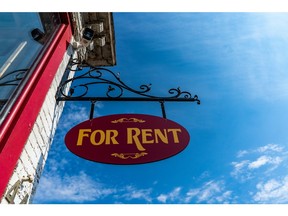Province mum on how to interpret phased-in rent legislation
'Discretionary' rent hike decision-making lacks uniformity: landlord

Article content
A Crown corporation won’t say how its residential tenancies officers are being directed to interpret phased-in rent increase legislation.
The Higgs government introduced the rent review process last year as a replacement to the province’s one-year rent cap. Instead of a ceiling on rent increases, tenants can have above-inflation hikes spread out over either two or three years following a review by a residential tenancies officer.
But the phased-in section of the Residential Tenancies Act has been interpreted differently over the last year by the legal system and the housing minister herself.
Last May, Housing Minister Jill Green announced financial aid for a handful of tenants after they were denied the phasing in of above-inflation rent increases. At the time, Green said the situation had been “corrected,” and moving forward, all above-inflation rent increases approved by tenancies officers would be phased in over multiple years.
But in a recent legal challenge of a rent hike decision, a Court of King’s Bench judge interpreted the legislation to mean tenancies officers have the discretion – not the mandatory power – to order phased-in rent increases.
This is just kind of ridiculous.
Peter Jongeneelen
As of last spring, the New Brunswick Housing Corporation is responsible for the regulation and enforcement of the Residential Tenancies Act. The Tenant and Landlord Relations Office (TRLO) handles rent review requests.
Each rent increase case is “individually reviewed and is at the discretion of the residential tenancies officer whether the phased-in approach is deemed appropriate” as per the Residential Tenancies Act, according to government spokesperson Rebecca Howland.
Brunswick News asked how tenancies officers are being directed to interpret the phased-in section of the legislation. That section has not changed since its adoption in December 2022.
“Housing NB cannot speak to individual interpretation of the legislation, but the TRLO is mandated to apply the Residential Tenancies Act as is,” Howland said.
All tenants can apply for a rent review no matter the size of the increase, but only those with increases above the previous December’s consumer price index – 3.6 per cent – are eligible for phased-in hikes over two or three years.
Renters could feel impact of ambiguity
Renters could ultimately be hurt financially by the ambiguity surrounding the legislation.
Karen Sharp is now considering whether to advise the apartment building owners she represents to significantly increase their rents, if necessary, based on the judge’s recent interpretation of the legislation.
Sharp is the president and owner of Leading Edge Property Solutions, the Saint John-based property management firm that took a phased-in rent increase decision made by the former Residential Tenancies Tribunal (now TRLO) to court.
She successfully argued her client had been denied “procedural fairness” in part because the tribunal didn’t provide a rationale for why phased-in rent increases were granted to two tenants whose above-20 per cent hikes had been deemed “reasonable” for the area.
After the decision was issued, Howland said TRLO was reviewing it and would “closely consider all options available.”
Sharp said Friday she had just sent out a batch of rent increase increases, “so we’re not due to send them out again for a few months.”
“I think I’ll see what other landlords are doing because as I mentioned, there is some chitchat that (landlords) are going to go in at high increases and have them spread out over three years so at over three years, they will be at market rent.”
Sharp said she still doesn’t have clarity on the TRLO’s interpretation of the phased-in rent legislation.
“The issue that I have is that they’re saying it’s discretionary,” she said. “Well, we all use our discretion in different ways, so to me, there is no sort of uniformity there.”
The easiest solution would be the return of a rent cap, according to Peter Jongeneelen, co-chair of tenants’ rights group ACORN NB.
New Brunswick let its one-year, 3.8 per cent rent cap expire at the end of 2022. The average rent for an apartment in New Brunswick rose 9.5 per cent between 2022 and 2023, according to new data from the Canada Mortgage and Housing Corporation.
If the phased-in legislation is kept in place, Jongeneelen said there should be a cap on the amount of the increase that can be spread out over multiple years.
“That adds clarity for everyone and it’s not left up to interpretation by a Tenant and Landlord Relations officer to determine,” he said.
“This is just kind of ridiculous.”












Postmedia is committed to maintaining a lively but civil forum for discussion. Please keep comments relevant and respectful. Comments may take up to an hour to appear on the site. You will receive an email if there is a reply to your comment, an update to a thread you follow or if a user you follow comments. Visit our Community Guidelines for more information.